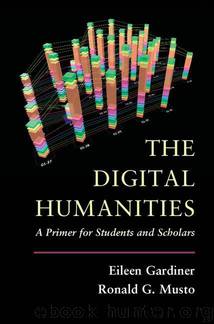The Digital Humanities: A Primer for Students and Scholars by Eileen Gardiner & Ronald G. Musto

Author:Eileen Gardiner & Ronald G. Musto
Language: eng
Format: mobi
Publisher: Cambridge University Press
Published: 2015-06-29T22:00:00+00:00
Funding Strategies
Funding digital projects was once considered problematic, and special programs were established to help, like the NEH Digital Humanities Start-Up Grants,40 Alfred P. Sloan Foundation Digital Information Technology Grants,41 the ACLS Digital Innovation Fellowships42 and the ACLS HEB subsidies to publishers to directly fund e-book production. In truth, while individual digital humanists might still have difficulties funding digital publication, digital research has become almost indistinguishable from any other research in the humanities, and unless scholars are interested in developing specialized tools or purchasing expensive equipment, most research grants will cover most digital research. Digital tools are just the ones that scholars now happen to use, and for the most part as far as digital humanities models have developed, there seems to be nothing essentially different in the nature of the individual research.
Problems arise when scholars are at institutions that do not provide a great deal of research support in the first place, and then they must turn to outside funders. In such cases the appeal to digital humanities – for projects or new centers – may be motivated less by innovative approaches to traditional humanities research questions than by the possibility of tapping new sources of funding for ongoing work. In other situations, such as in archaeological, architectural or visual history, many projects may be conceived that are in fact innovative either in their data gathering or their publication methods, involving high-end technologies for recording, searching, analyzing and representing data. A range of solutions has been adopted, and we have noted various funding sources in our discussions in Chapter 6.
The key may lie in assembling a consortium of stakeholders to both minimize the risk of exposure for any one funder and to help spread support for digital humanities projects. The NEH continues to fund individual and collaborative projects, as does ACLS; but these are not institutional solutions. While The Andrew W. Mellon Foundation continues to fund institutional start-up and experimental projects, continuously seeking to broaden horizons and break down boundaries, it has not been as successful in long-term sustainability of such projects once launched and ongoing.43 By involving a variety of university, museum, library, foundation and private support, humanists can scale the impact of their own research and transform what had once been the solitary efforts of single scholars into broader collaborations with some chance of long-term survival. Key to such strategies is setting clear-cut goals for institutional mission and sustainability, including both financial support for the ongoing research and development and – equally important – institutional support for the survival of such projects. The latter involves both the mechanics of hosting complex projects once completed and the proper curatorial and technical staffing for the long term. Such planning does involve a major change in humanists’ thinking, a transformation that sees digital work less as the solitary achievement of a Petrarch or Boccaccio and more like the foundational work of Vespasiano da Bisticci or Poggio Bracciolini in establishing libraries. Can humanities culture change to reward such collaborative work? Is
Download
This site does not store any files on its server. We only index and link to content provided by other sites. Please contact the content providers to delete copyright contents if any and email us, we'll remove relevant links or contents immediately.
Secrets of the JavaScript Ninja by John Resig Bear Bibeault(20671)
Kotlin in Action by Dmitry Jemerov(19724)
Grails in Action by Glen Smith Peter Ledbrook(16997)
Sass and Compass in Action by Wynn Netherland Nathan Weizenbaum Chris Eppstein Brandon Mathis(14478)
WordPress Plugin Development Cookbook by Yannick Lefebvre(4413)
Ember.js in Action by Joachim Haagen Skeie(4153)
Mastering Azure Security by Mustafa Toroman and Tom Janetscheck(3542)
Learning React: Functional Web Development with React and Redux by Banks Alex & Porcello Eve(3183)
The Innovators: How a Group of Hackers, Geniuses, and Geeks Created the Digital Revolution by Walter Isaacson(3159)
A Blueprint for Production-Ready Web Applications: Leverage industry best practices to create complete web apps with Python, TypeScript, and AWS by Dr. Philip Jones(3131)
Mastering Bitcoin: Programming the Open Blockchain by Andreas M. Antonopoulos(3035)
The Art Of Deception by Kevin Mitnick(2796)
Drugs Unlimited by Mike Power(2591)
Hands-On Cybersecurity with Blockchain by Rajneesh Gupta(2461)
Kali Linux - An Ethical Hacker's Cookbook: End-to-end penetration testing solutions by Sharma Himanshu(2390)
Writing for the Web: Creating Compelling Web Content Using Words, Pictures and Sound (Eva Spring's Library) by Lynda Felder(2349)
SEO 2018: Learn search engine optimization with smart internet marketing strategies by Adam Clarke(2262)
JavaScript by Example by S Dani Akash(2218)
DarkMarket by Misha Glenny(2207)
